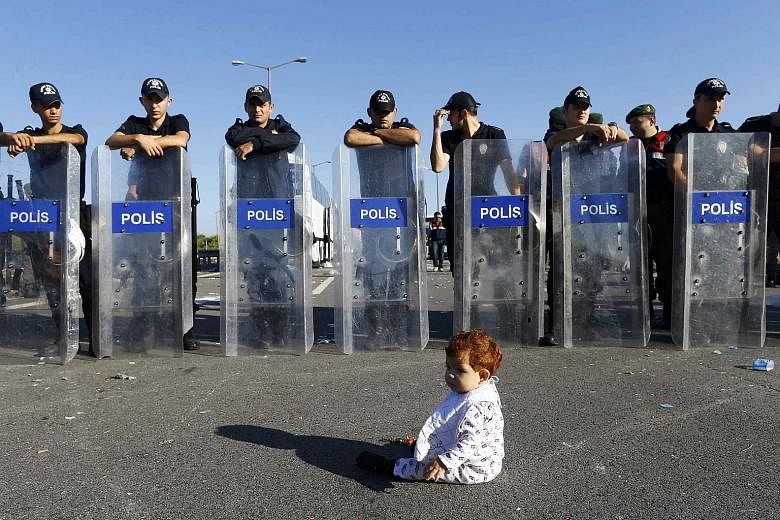ESKILSTUNA (Sweden) • Mahmud Zaraa is 13, a hint of a moustache budding on his upper lip. Strolling through the tranquil Swedish town of Eskilstuna, it is a world away from the war-ravaged Syria he fled without his family.
Mahmud is one of 10,000 unaccompanied children who have sought asylum in Sweden since the beginning of the year - a sharp rise from previous years - making it the European Union (EU) nation with the highest number by far.
Sweden's Migration Board has described the influx as "extraordinary". According to the United Nations Children's Fund, the number of children seeking asylum in Europe stood at 106,000 in the first six months of this year.
But while children in Sweden are looked after, those in other parts of Europe, such as Italy, are exploited, reports the BBC. In southern Italy, some reception centres are paid up to €75 (S$120) a day for every child they house, as opposed to €35 a day for adults. That has led to a rush to open private centres where there is little control over what happens inside. There are reports of malpractice in state-run centres, too, including links to the Italian mafia.
Thousands of children have run away from these centres, disappearing in the streets, where they are left to fend for themselves by dabbling in petty theft, selling drugs for bigger gangs and occasionally engaging in prostitution.
One boy, Khaled, 14, told the BBC that he started selling drugs to buy food. "I did it to avoid doing what other boys I know here are doing - having sex with Italian men. I have seen it with my own eyes. Boys - Egyptian, Tunisian and Moroccan - ask men for €50, even for €30," said Khaled.
The BBC investigation also highlighted the menace of debt bondage, where traffickers would force children as young as 13 into prostitution to pay for their journeys to Europe. The going rate for sex on an infamous 15km deserted stretch in Abruzzo is €15, so paying back the €50,000 to €60,000 the traffickers want will take years.
Mahmud, meanwhile, appears unusually calm and well-adjusted, chatting happily about playing football as he sips orange juice. His manner reveals no trace of his dramatic three-month journey to Sweden, covering part of Europe on foot before ultimately ending up in this town of 100,000 people. The teenager is now living with a great-uncle and his family.
For many migrants, though, their struggle to reach safe havens in Europe continues. Thousands of migrants were stranded in the western Balkans yesterday as Croatia, Hungary and Slovenia tussled over the escalating crisis.
Croatia said yesterday it had "forced" Hungary to take in thousands of migrants and would continue sending them to its northern neighbour.
Some 3,000 entered Hungary by bus and train last Friday. More were expected, as buses on the Hungarian side of the border lined up in the village of Beremend.
On Croatia's western flank, some 1,200 migrants have crossed into Slovenia. Slovenian Prime Minister Miro Cerar said he would discuss with Slovenia's neighbours the possibility of creating a "corridor" through the country if the influx became too much.
Meanwhile, a five-year-old Syrian girl was found dead yesterday and as many as 13 refugees were believed to be missing when their boat sank. The Greek Coast Guard said it had rescued 11 people and was looking for other survivors.
REUTERS, AGENCE FRANCE-PRESSE

